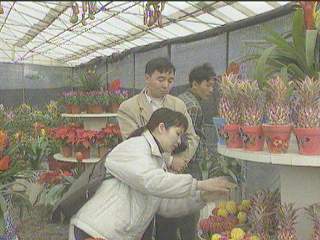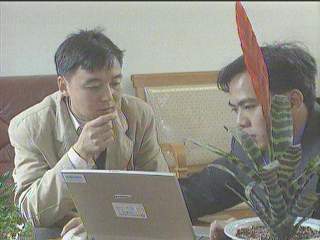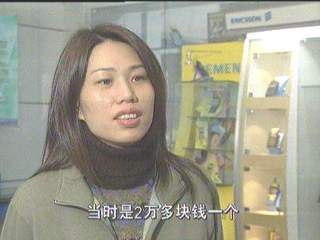 Only decades ago, Chinese people spent a lot of effort and money on communicating with people living in other places, especially abroad. Most people had to send mail several days in advance to friends, and in case of emergency; people could only rely on faxes or telegrams. But nowadays, communications are developing at a remarkable speed. Ordinary people can use a variety of ways such as the internet or mobile phone to stay in touch with friends thousands of miles away.
Only decades ago, Chinese people spent a lot of effort and money on communicating with people living in other places, especially abroad. Most people had to send mail several days in advance to friends, and in case of emergency; people could only rely on faxes or telegrams. But nowadays, communications are developing at a remarkable speed. Ordinary people can use a variety of ways such as the internet or mobile phone to stay in touch with friends thousands of miles away.
Lian'an is a small village in Nanhai City, in south China's Guangdong Province. It is a village famous for its flower industry. In recent years, it made good profits by growing and selling flowers; some of the residents even organized a nursery and a florist. During the past Spring Festival, the most important holiday season in China, a lot of buyers came to visit this nursery. The most impressive thing about this business is that it uses the most up-to-date technology and the internet to manage the business. Now, instead of waiting for the buyers to come to the nursery to select products, they can let potential buyers both in and outside China see the flowers on-line.
Jiang Ping, manager of Guangdong Datang Gardening Company, said, ”In the past, our main way of communicating was via the telephone, and then we sent flowers by trucks. We could only access customers living nearby. Now by using the internet, we have made our flowers well known and sell them to people all across the country and even further afield.”
 Jiang and his colleagues took pictures of the flowers and put them on a website. People can get useful information about the products through the internet. The Internet has not only shortened the distance between Datang Gardening Company and the market, but also saved on costs.
Jiang and his colleagues took pictures of the flowers and put them on a website. People can get useful information about the products through the internet. The Internet has not only shortened the distance between Datang Gardening Company and the market, but also saved on costs.
The manager said, “When we sign contracts, we no longer need to see the buyer in person, we don't have to fax them the contract either. Now, the only cost is to maintain a good homepage so that we can sign any contract on line. It is a simple and cheap method. In the past, for instance, to complete only one order, say an order from the US, we had to pay 10% of the whole revenue, including telephone and fax charges. But now, only several RMB yuan is enough to cover the entire process.”
With a little help, Jiang built the homepage of his company. So, he can make and revise contracts on line at any time. But what he wants to do most currently is inviting experts to give lectures to his employees and to exchange experience with flower growers all over the world. Since he started using the internet, his views have changed and he now thinks about a bigger picture. He hopes to open some chain stores to sell flowers in big cities like Beijing and Shanghai, to realize a real large-scale e-business.
Nanhai, in which Jiang Ping's Gardening company is located is only a small city in Guangdong Province, but it makes an annual GDP of more than 40 billion yuan or almost 5 billion US dollars. In year 2000, mobile phone users in Nanhai reached over 300,000, and internet users increased to 60,000 subscribers. The fast development of methods of communication will make this city a richer place.
In Beijing Telecom's Dongdan Office, a Ms. Yu is applying for a new service for her home telephone. The service is a line-splitter, which enables the user to keep the phone line free when somebody is using a modem.
Yu Hai, a Beijing resident, said, “Because I often go on line, sometimes it is not convenient to make or receive a phone call. So I considered installing a line-splitter, so I can go on line and make phone calls at the same time.”
The line-splitter is a product used to upgrade the function of an ordinary telephone. It enables double track communication. Installing a line-splitter is the same as installing a second phone. Because of an increasing demand for tele-communications, this new service was welcomed after it was launched in 2000, with a total number of 4 million applicants.
Ms Yu said that when she first installed a telephone over 10 years ago, it cost her almost 5,000 yuan, but now the same service costs around 1,000 yuan and is faster to install. According to the workers in this office, many families are considering installing a second home phone for greater convenience. In big cities such as Beijing and Shanghai, installing a second phone is free. Residents don't have to pay much to keep in touch.
While fixed telephones are on the increase, mobile telephones are also becoming another important indispensable means of communications for many people. Just a few years ago, having a mobile phone was a symbol of luxury, but now it has become so common that most Chinese can afford to buy and use one. Guangdong Province was the first to offer mobile services. Now mobile phone users in Guangdong number over 11 million. Today many mobile users are applying for short-message services.
Zhu Junlin, a businessperson, said, “I sell clothes. When I go out on business, I need to know about the weather conditions. I can check on it immediately using my mobile phone. And another thing is although my English isn't great, when I encounter a new word, I can put it into my phone, and it will translate for me right away.”
Zhu said that when he first came to Guangzhou from his hometown Hunan, he didn't have a home telephone. So the mobile phone was very convenient for him.
He said, “A mobile phone is really convenient for me, especially when I am out. My colleagues can get in touch with me easily in case of emergency. Or if I encounter difficulties, I can also call the company for help.”
In 1987, when Guangdong Province first started mobile phone services, it used a network of analogue codes. At that time, mobile phone buyers were few. A mobile phone, which was as big as a brick, was a status symbol. According to mobile phone user Ms. Chen, who is applying for a new mobile service, the mobile phone she bought in 1994 was quite big, and she had to make a special bag to hold it. But now, the phone hangs round her neck as a fashion accessory.
 Ms. Chen said, ”When I first bought a mobile phone several years ago, it was very big. It was like a water jug, big and heavy. It cost me over 20 ,000 yuan then. Also, it was not easy to get one. Later, mobile phones became smaller and cheaper. And now we have smaller and smaller mobile phones to choose from. The signal is also stronger and phone calls are easier to make and listen to.”
Ms. Chen said, ”When I first bought a mobile phone several years ago, it was very big. It was like a water jug, big and heavy. It cost me over 20 ,000 yuan then. Also, it was not easy to get one. Later, mobile phones became smaller and cheaper. And now we have smaller and smaller mobile phones to choose from. The signal is also stronger and phone calls are easier to make and listen to.”
Mobile phones have brought ordinary people more convenience in their daily life. Furthermore, mobiles are not just for making calls - they can also send messages or other new services. Communications are becoming more diversified. In Guangdong, apart from sending short messages, there are another 20 services in use.
Li Gang, chairman of the Board of Guangdong Mobile Phone Telecom Co. Ltd. Said, ”Now, we have new services, such as access to the internet, stock exchange, information, news, weather and transportation information checks. All these have been welcomed by users.”
Having electricity and a telephone was what most Chinese dreamed of for a better life 20 years ago. But now, we don't think twice about making a phone call. With the increasing use of home phone lines, mobiles, magnetic card phones, IC card phones and other services, there are many ways for people to stay in touch. Convenient communications have brought China even closer to the rest of the world.
|